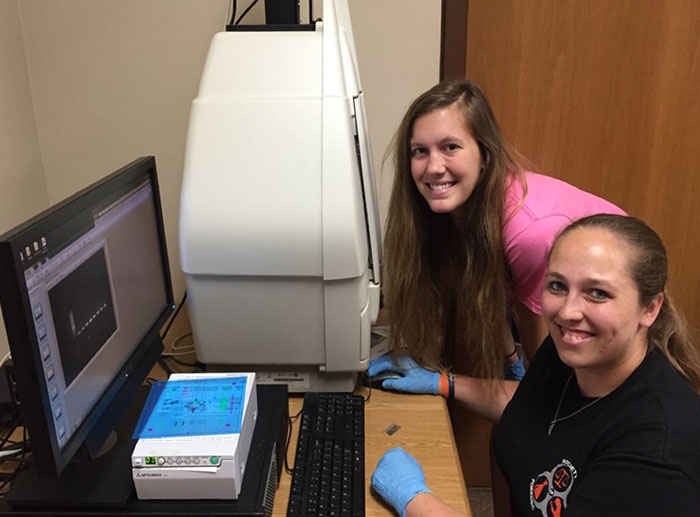LeAnn Harrel
Funding provided by the College of Sciences Dean’s Office
For this project, we were able to delete a gene called recA from the bacterial species Rhodobacter sphaeroides. Although this gene’s protein product (RecA) is not necessary for the cell to grow in normal conditions, it regulates a bacterial DNA repair system called the SOS Response, so it is vital for cell survival when its DNA gets damaged, such as through UV exposure. To see how much an effect this deletion had on the bacteria, we exposed the mutant strain and the original (wild type) strain to increasing amounts of UV radiation to see how much it took to kill each strain. As expected, the mutant strain died at a much lower exposure than the wild type. Next, we wanted to see if we could re-introduce RecA to the mutant cells in order to allow the SOS response to be activated. The process to do this is called cloning, which involves inserting the original gene into a DNA expression vector, then transferring that vector into the mutant cells. Unfortunately, we ran into several road blocks throughout the course of this part of the experiment, but it was a great learning experience to be able to critically analyze each step that was done to see where an error might have been made or to think of a way to improve the method to get better results. This summer allowed me to work on the project as if it were a real job instead of just whenever I could fit it in, like I had been doing for the past three semesters. I came into the lab each week day from 9 am – 4 pm, planned out everything I was going to do each day for that week, and had weekly meetings with Dr. Choudhary and the rest of our lab members to discuss results and get outside opinions about what was going on that week. Since I was the project leader, I gained experience in delegating certain tasks as well as teaching my partner about the history of the project and some of the necessary experimental procedures. I plan on getting my Master’s degree in Forensic Science with a concentration in DNA in order to work in a crime lab testing DNA samples, so many of the techniques and equipment I used will give me an advantage in my future course and career work. I am very grateful for this opportunity and highly recommend it to other undergraduates.
This summer allowed me to work on the project as if it were a real job instead of just whenever I could fit it in, like I had been doing for the past three semesters. I came into the lab each week day from 9 am – 4 pm, planned out everything I was going to do each day for that week, and had weekly meetings with Dr. Choudhary and the rest of our lab members to discuss results and get outside opinions about what was going on that week. Since I was the project leader, I gained experience in delegating certain tasks as well as teaching my partner about the history of the project and some of the necessary experimental procedures. I plan on getting my Master’s degree in Forensic Science with a concentration in DNA in order to work in a crime lab testing DNA samples, so many of the techniques and equipment I used will give me an advantage in my future course and career work. I am very grateful for this opportunity and highly recommend it to other undergraduates.
